East and Southern Africa
Contact the team
Featured content

The Changing Landscape of Cash Preparedness: Lists, Risks and Relationships
Report
What are feasible lead times to deliver CVA to recipients in the Horn of Africa? What are the barriers and enablers to ensuring a timely and high quality humanitarian response? What does it take for organizations to be effectively prepared?

Community Reflections: The Cumulative Impact of Keeping People Informed
Report
This briefing note presents an overview of the findings from Ground Truth Solutions’ in-depth, qualitative interviews with community representatives of displaced people and aid recipients in Nigeria and Somalia in May and June 2022. As part of the Cash Barometer initiative, we invited youth leaders, women’s leaders, traditional community leaders and community members in Nigeria and Somalia...
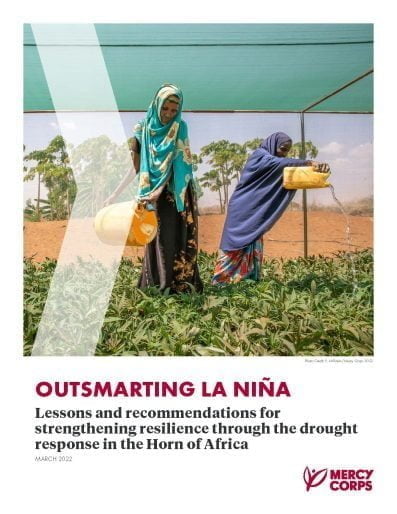
Outsmarting La Niña: Lessons and Recommendations for Strengthening Resilience Through the Drought Response in the Horn of Africa
Policy paper
One of the worst droughts in a generation is currently unfolding in the Horn of Africa. The impacts of the drought are exacerbated by, and in some cases further fueling, increases in conflict in the region. As a result, more than 13 million people in Ethiopia, Kenya, and Somalia are already experiencing extreme hunger. In many ways, those living in the drylands of the Horn are more prepared...
All news and events
201 – 220 of 366 results
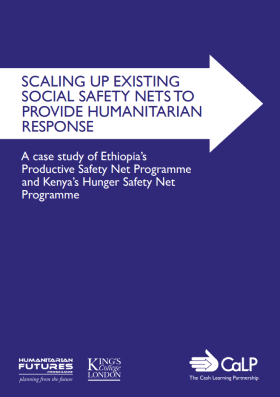
Scaling Up Existing Social Safety Nets to Provide Humanitarian Response: A case study of Ethiopia’s Productive Safety Net Programme and Kenya’s Hunger Safety Net Programme
Policy paper
A case study of Ethiopia’s Productive Safety Net Programme and Kenya’s Hunger Safety Net Programme. This thematic report has been undertaken as part of a 2013 research study entitled, Is Cash Transfer Programming ‘Fit for the Future’? The research was commissioned by the the CALP Network and...
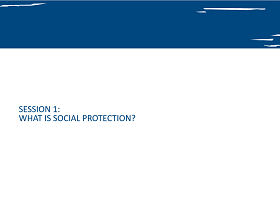
What is social protection?
Report
This presentation was made on behalf of UNICEF at the social protection framework validation meeting that took place at the Jacaranda Hotel in Nairobi, Kenya on 26 September 2014. It looks at components and dimensions of social protection, lessons from global experiences and some limitations of the...

Factors Affecting the Cost-efficiency of Electronic Transfers in Humanitarian Programmes
Report
Led by Oxford Policy Management (OPM) with support from Concern Worldwide, this research aims to answer the key question: Are electronic transfers more cost-efficient than traditional manual based cash delivery methods, and under what conditions? Cash is increasingly offered to households in...
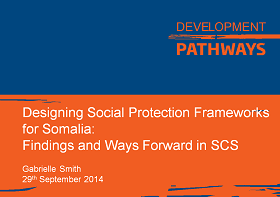
Designing Social Protection Frameworks for Somalia: Findings and Ways Forward in SCS
Report
This presentation was made on behalf of Development Pathways at the social protection framework validation meeting that took place at the Jacaranda Hotel in Nairobi, Kenya on 26 September 2014. It looks at designing social protection frameworks for Somalia and covers: 1.Activities and Methods 2.Macro...
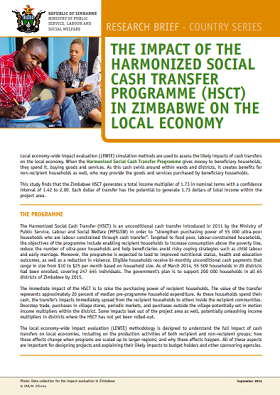
The Impact of the Harmonized Social Cash Transfer Programme (HSCT) in Zimbabwe on the Local Economy
Report
Local economy-wide impact evaluation (LEWIE) simulation methods are used to assess the likely impacts of cash transfers on the local economy. When the Harmonized Social Cash Transfer Programme gives money to beneficiary households, they spend it, buying goods and services. As this cash swirls around...

Understanding the Interaction Between Women’s Economic Empowerment and Gender Based Violence: Study on ACF’s cash transfer programme in northern Uganda
Report
This paper presents findings of a qualitative study conducted in Northern Uganda, on the effects of a cash transfer programme on gender relations and GBV in a post – conflict context. The intervention in focus is Action Against Hunger |ACF International (ACF)’s ‘Combating Gender Based Violence and...
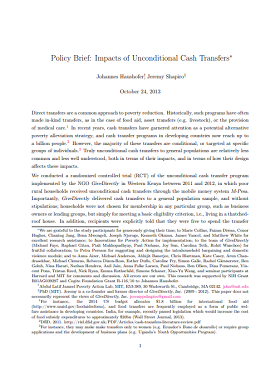
Policy Brief: Impacts of Unconditional Cash Transfers
Policy paper
This policy paper looks at a randomized controlled trial (RCT) of the unconditional cash transfer program implemented by the NGO GiveDirectly in Western Kenya between 2011 and 2012, in which poor rural households received unconditional cash transfers through the mobile money system M-Pesa. Importantly,...

Refugee Economies: Rethinking popular assumptions
Report
‘Refugee economies’ remain under-researched and poorly understood and there is a lack of good data available on the economic lives of displaced populations. Existing economic work on refugees tends to focus narrowly on refugee livelihoods or on the impact on host states. Yet, understanding these...

Market Analysis for Preparedness: The urban informal settlements of Nairobi
Report
The last few years have seen a significant change in the way humanitarian organisations approach response design. Partly spurred on by the growth in cash transfer programming and market-based programming, the practice of working through and supporting local markets is now widely considered best practice...
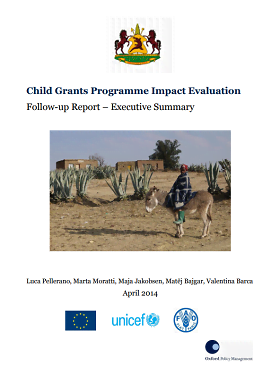
Child Grants Programme Impact Evaluation Follow-up Report – Executive Summary
Case Study
The Lesotho Child Grants Programme (CGP) is an unconditional social cash transfer targeted to poor and vulnerable households. It provides every quarter a regular transfer of between M360 and M7501 to poor households with children that are selected through a combination of Proxy Means Testing (PMT) and...

Regional Learning Event: “Links between emergency cash transfer programming and social safety nets in the Sahel.” – Final report
Report
Cash transfers are nowadays widely used in response to the food and nutrition crises that affect the Sahel. Since the crisis of 2012, many stakeholders (including governments, United Nations agencies, international or local non-governmental organisations) have made use of them – at scale, in some cases....
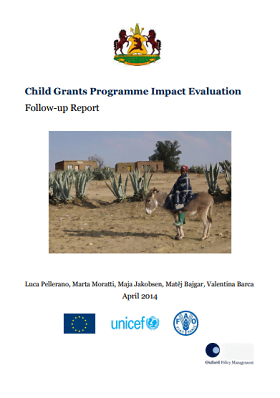
Child Grants Programme Impact Evaluation Follow-up Report
Report
The Lesotho Child Grants Programme (CGP) is an unconditional social cash transfer targeted to poor and vulnerable households. It provides every quarter a regular transfer of between M360 and M7501 to poor households with children that are selected through a combination of Proxy Means Testing (PMT) and...
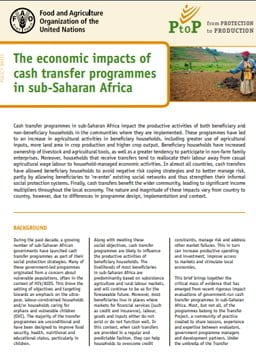
The Economic Impacts of Cash Transfer Programmes in Sub-Saharan Africa
Report
This brief brings together the critical mass of evidence that has emerged from recent rigorous impact evaluations of government-run cash transfer programmes in sub-Saharan Africa. Most, but not all, of the programmes belong to the Transfer Project, a community of practice created to share lessons,...
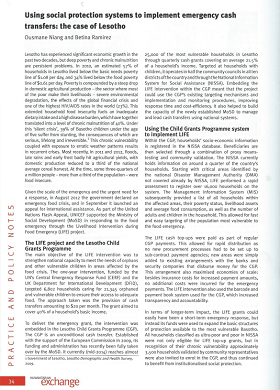
Using social protection systems to implement emergency cash transfers: the case of Lesotho
Report
Lesotho has experienced significant economic growth in the past two decades, but deep poverty and chronic malnutrition are persistent problems. Given the scale of the emergency and the urgent need for a response, in August 2012 the government declared an emergency food crisis, and in September it...
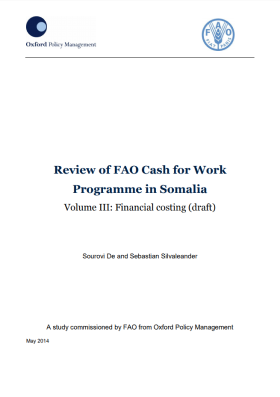
Review of FAO Cash for Work Programme in Somalia
Report
The objective of this costing study is to understand the absolute and relative magnitudes of various drivers of programme costs and to assess the cost-efficiency of the CFW Programme’s operations, using the total cost-to-transfer ratio (TCTR) for the programme which represents the total cost incurred by...
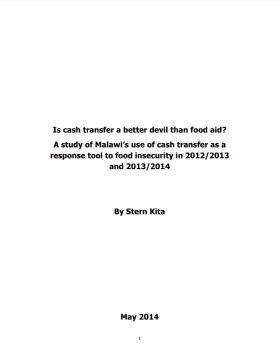
Is Cash Transfer a Better Devil than Food Aid? A study of Malawi’s use of cash transfer as a response tool to food insecurity in 2012/2013 and 2013/2014
Report
The 2004 Indian Ocean Tsunami is considered as the first humanitarian situation where cash transfers were used as an alternative to food aid. Since then, cash transfers have been used as a standalone response tool to disasters, or used in combination with food aid. Malawi piloted the use of cash...

Communications Technology and Humanitarian Delivery – Challenges and Opportunities for Security Risk Management
Report
The articles contained in this publication are dispatches from a new frontline in humanitarian action: the digital frontier. All are written by those observing, experiencing and attempting to respond to the challenges created by the digital revolution and the very real threats it is creating for...
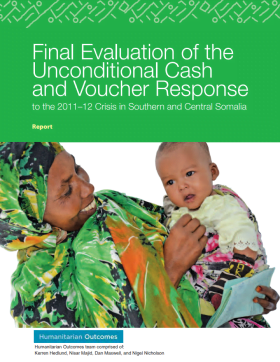
Final Evaluation of the Unconditional Cash and Voucher Response to the 2011–12 Crisis in Southern and Central Somalia
Report
This report sets out to determine the effectiveness of the unconditional cash and voucher interventions in southern and central Somalia. This evaluation however cannot be limited to the interventions at hand. It necessarily considers the broader context that led to the failure of the humanitarian...
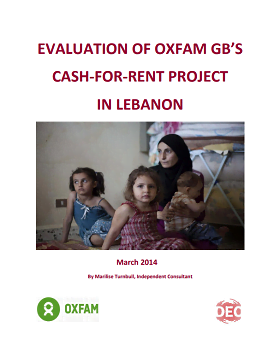
Evaluation of Oxfam GB’s Cash for Rent Programme in Lebanon
Report
In March 2013 the DEC launched an appeal to respond to the humanitarian crisis caused by the deepening civil war in Syria. Oxfam GB was allocated a total of £1,189,797 of the £12 million raised, of which it apportioned £237,951 to assisting Syrian refugees in Lebanon. This evaluation found that Oxfam...
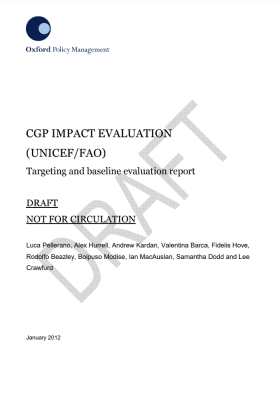
CGP Impact Evaluation (UNICEF/FAO): Targeting and baseline evaluation report
Report
The Child Grants Programme (CGP) is an unconditional cash transfer targeted to poor and vulnerable households in Lesotho. The primary objective of the CGP is to improve the living standards of Orphans and Vulnerable Children (OVC) so as to reduce malnutrition, improve health status, and increase school...




